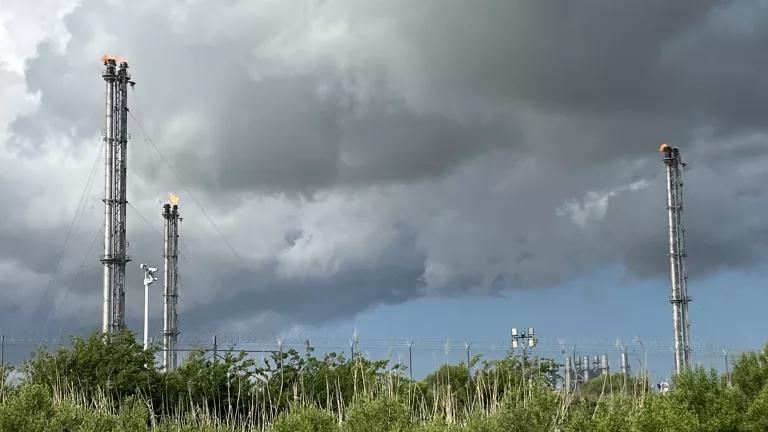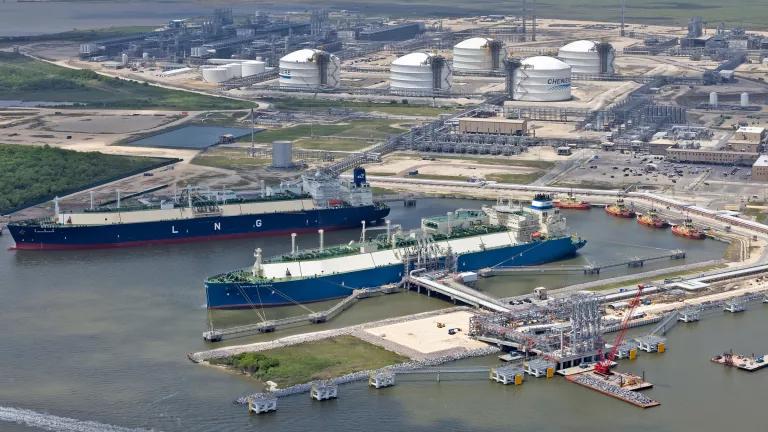
The recent G7 Leaders’ Communique demonstrated some steps forward for climate action, however the new push to support liquefied natural gas (LNG) infrastructure worldwide is cause for concern. Despite the host Germany’s intention to prioritize climate action, the reverberations of the Russian war in Ukraine led G7 leaders to signal the importance of short-term investments in LNG.
This signal stands in stark contrast with the International Energy Agency (IEA) and Intergovernmental Panel on Climate Change (IPCC) and other leading authorities that have clearly shown further investments in fossil fuels – including LNG – are not consistent with countries’ goal of holding warming to 1.5 °C (2.7 °F).
At COP26 in Glasgow last November, 39 countries and public finance institutions committed to end new direct public support for unabated fossil fuel energy internationally. And in May, G7 ministers agreed to a similar commitment – effectively bringing Japan into the fold. Those commitments represent a total of $39 billion per year in international finance, primarily from G7 countries, that can be shifted toward pressing clean energy needs in developing countries.
NRDC’s latest issue brief shows that expanding U.S. and global LNG exports and associated infrastructure jeopardizes the 1.5C (2.7F) global climate goal and is not a viable strategy to rapidly reduce emissions. If LNG supply is expanded as projected (see figure below), the world will blow through our remaining window to hold warming at relatively safer levels.
In Germany, G7 leaders added caveats to their original commitment to phase out new direct public support for international unabated fossil fuel energy this year. The signal of this “rollback” undermines momentum for all major emitters to enhance ambition by COP27 in Egypt this November. New gas infrastructure takes years to build and does not provide an effective near-term solution for rapidly reducing reliance on Russian fossil fuel imports. Additionally, the massive price volatility of LNG supplies will continue to cause instability rather than support true energy security.
In short, the G7 Leaders’ Communique sends a contradictory signal to the rest of the world at a time when we need unequivocal leadership and accelerated climate action to keep the Paris Agreement’s 1.5C temperature goal alive.
Mixed messages: U.S. LNG industry’s expansion undermines climate goals and increases consumer prices
In the first four months of 2022, LNG imports from the U.S. to the EU and the U.K. more than tripled (compared with 2021; see figure below), accounting for 49% of their total imports. And U.S. LNG supplies are set to rise for the foreseeable future with already planned project expansions, let alone the new investments that are being proposed because of the Ukraine war and welcoming signals from governments.

The G7 leaders’ statement opens the door to public investments in LNG globally and brings into stark relief the Biden Administration’s true commitment to advancing strong climate standards globally. Last December, the U.S. issued an interagency guidance that severely restricts support for overseas fossil fuel projects, including unabated gas projects. That guidance must continue to be robustly implemented, including maintenance of a very high bar for “rare cases” of exemptions for compelling national security or energy access benefits and where no viable lower carbon alternatives accomplish the same goal.
Relatedly on the domestic front, if the 25 new projects that are proposed or under construction in the U.S. go forward, it could lead to an additional 90 million tons of greenhouse gas emissions annually – more pollution than 18 million cars running for a year. For consumers, the continued pressure on exporting more LNG ties the domestic gas market to dramatically higher prices in the international market and, as a result, Americans pay significantly higher gas and electricity prices.
Straightforward solutions: Demand reduction and affordable, local, and clean alternatives
The U.S. and G7 must squarely focus must be on accelerating progress to achieve global climate goals and reducing reliance on Russian and broader fossil fuels that cause such volatility. Fortunately, there are clear win-win options: they include doubling down on clean solutions including accelerating renewable energy deployment, gas demand reduction, deploying more heat pumps and grid modernization. These measures are the most effective short- and long-term way to help meet G7 countries’ energy security and climate goals.
As European Commission President Ursula von der Leyen recently emphasized to European legislators, "Some say, in the new security environment after Russia's aggression, we have to slow down the green transition. This transition would come at the 'the cost of basic security,' they say. The opposite is true. If we all do nothing but compete about limited fossil fuels, the prices will further explode and fill Putin's war chest. Renewables are home-grown. They give us independence from Russian fossil fuels. They are more cost-efficient. And they are cleaner."
Studies show that there is clearly no need for introducing more unabated fossil gas sources globally. A recent modeling exercise by EMBER (see below) finds that Europe could achieve a clean, reliable, and expanded power system by 2035 at no extra cost compared with current, more polluting plans.

Additionally, according to the IEA fossil fuel operations account for more than a third of human-caused methane emissions. The IEA’s global Methane Tracker shows that in 2021 the energy sector was responsible for around 135 million tons of methane emitted into the atmosphere. Methane leaks in 2021 from fossil fuel operations, if captured and marketed, would have made an additional 180 bcm of fossil gas available to the market, an amount similar to all the gas used in Europe’s energy sector. The Oil and Gas industry must reduce its methane leakages urgently.
The emissions impact of higher LNG production and consumption is avoidable, the U.S. and the EU must step up their cooperation to reduce methane emissions.
Currently, the level of climate ambition from G7 leaders is not adequate to the moment. It couldn’t be clearer that the gas bridge is broken, expensive to repair, and unnecessary. G7 countries’ energy security plans for ending dependence on Russian imports must be fossil free and not endanger global decarbonization goals.





